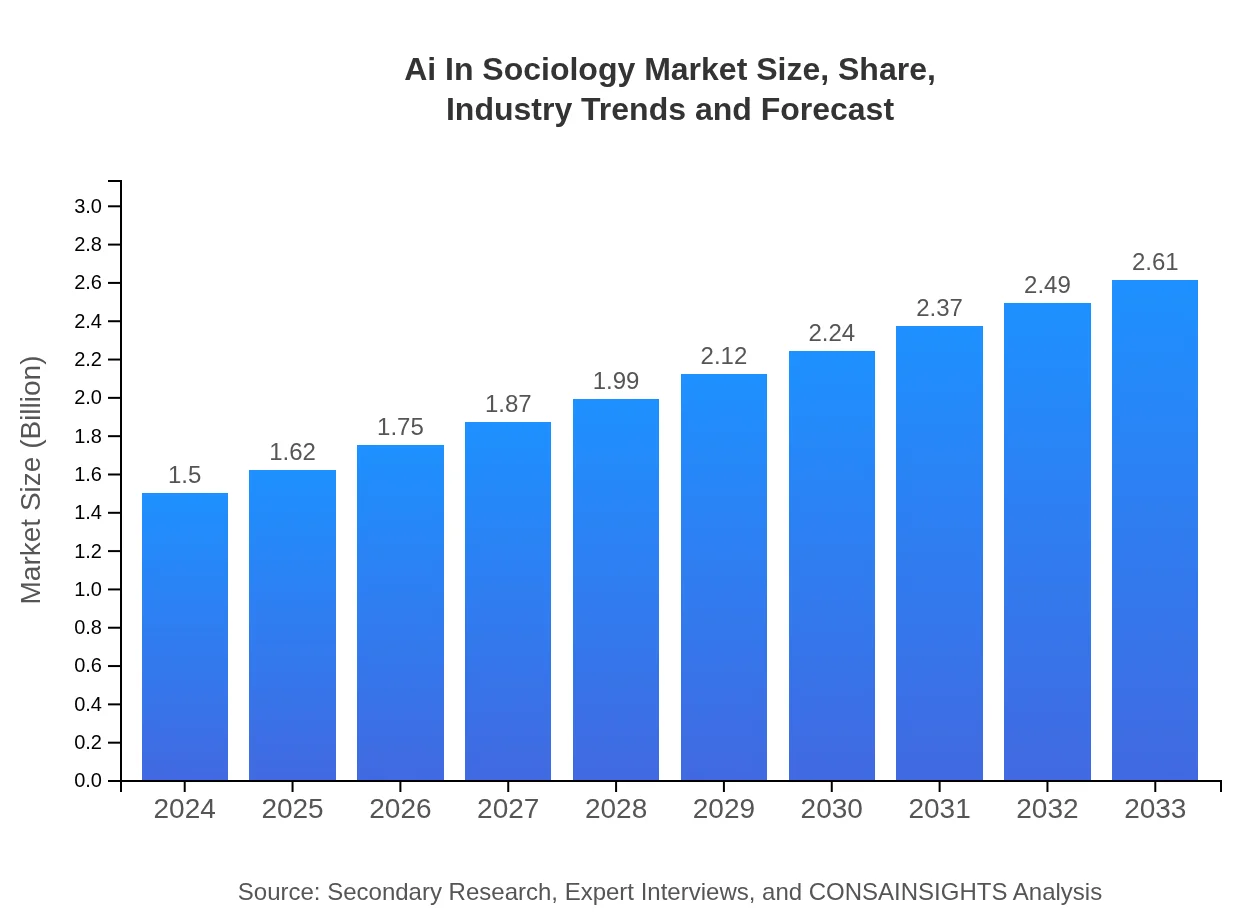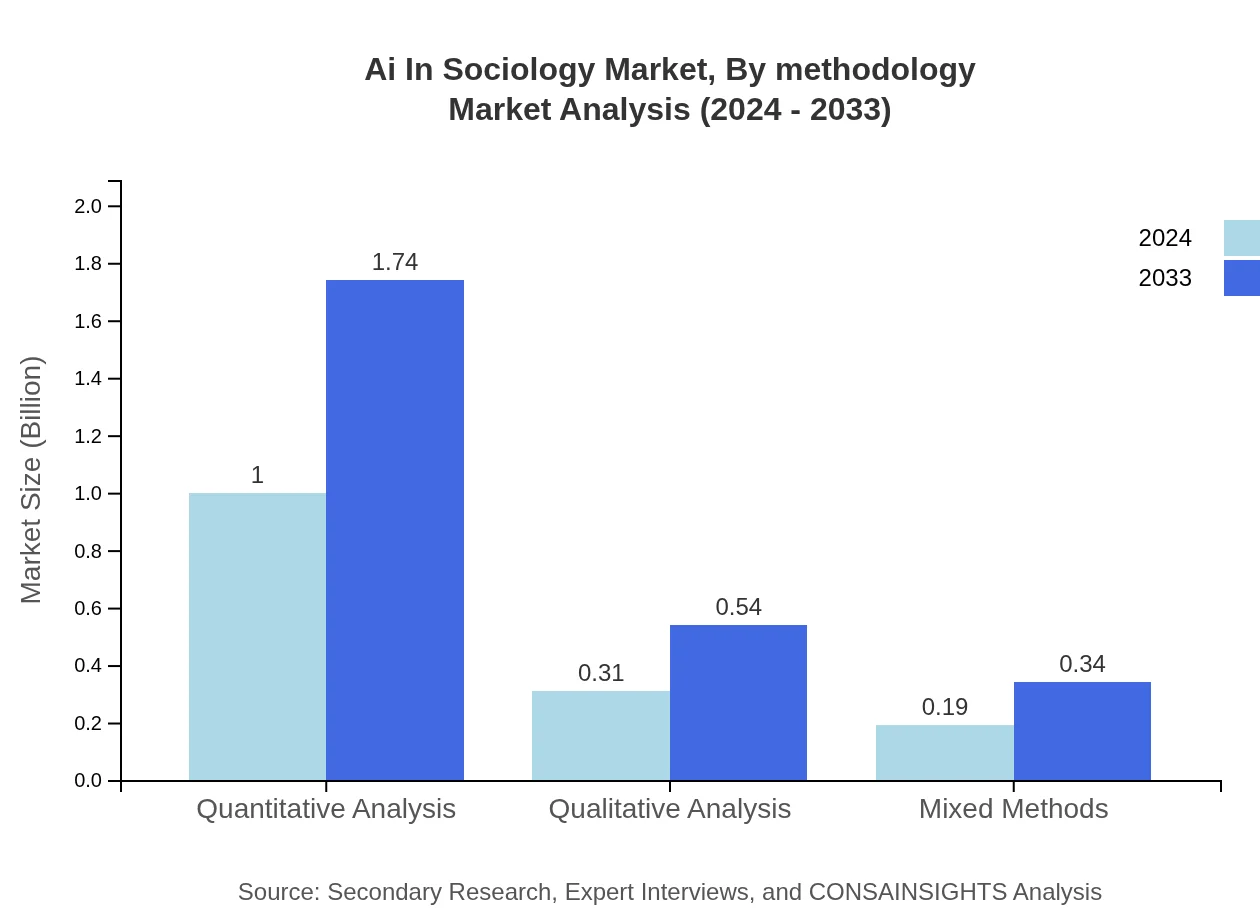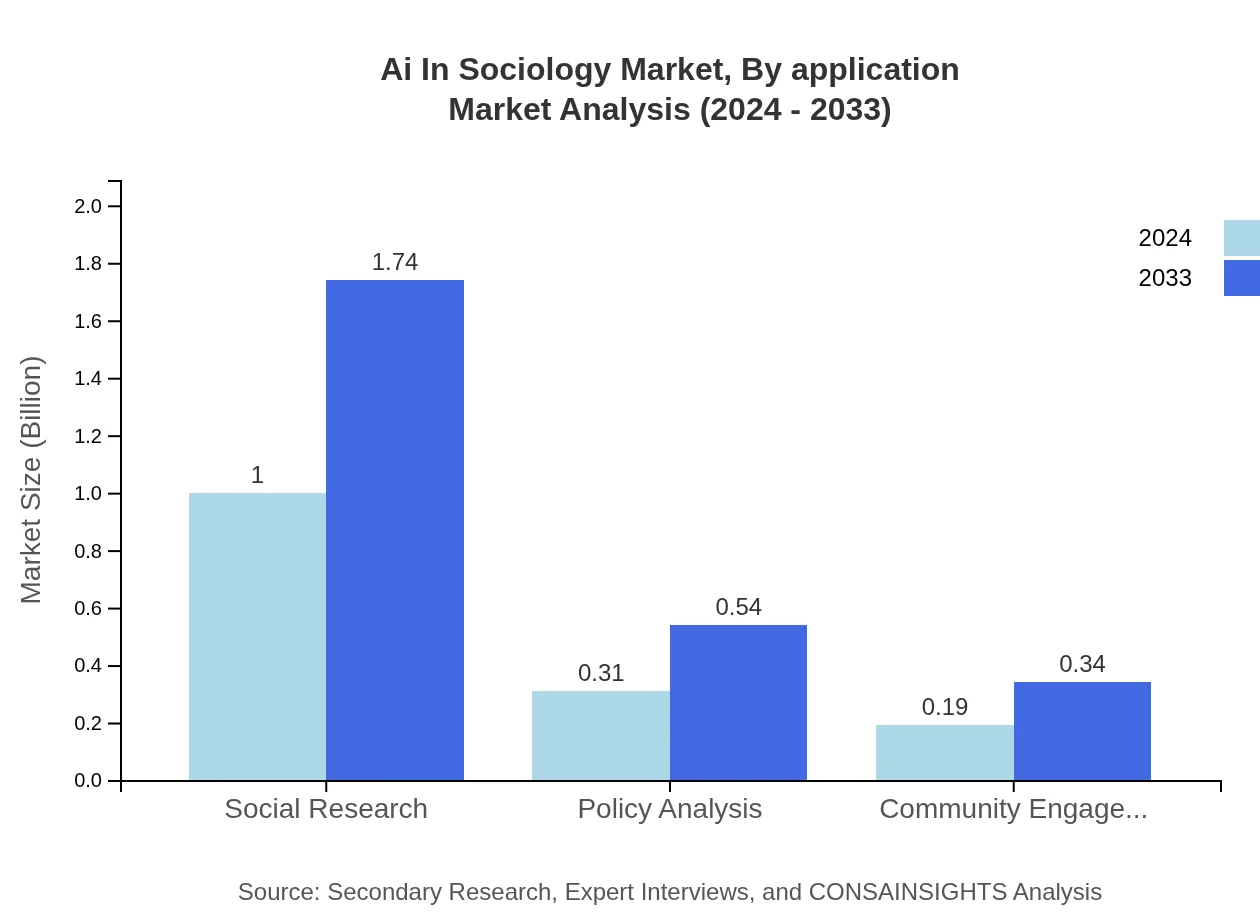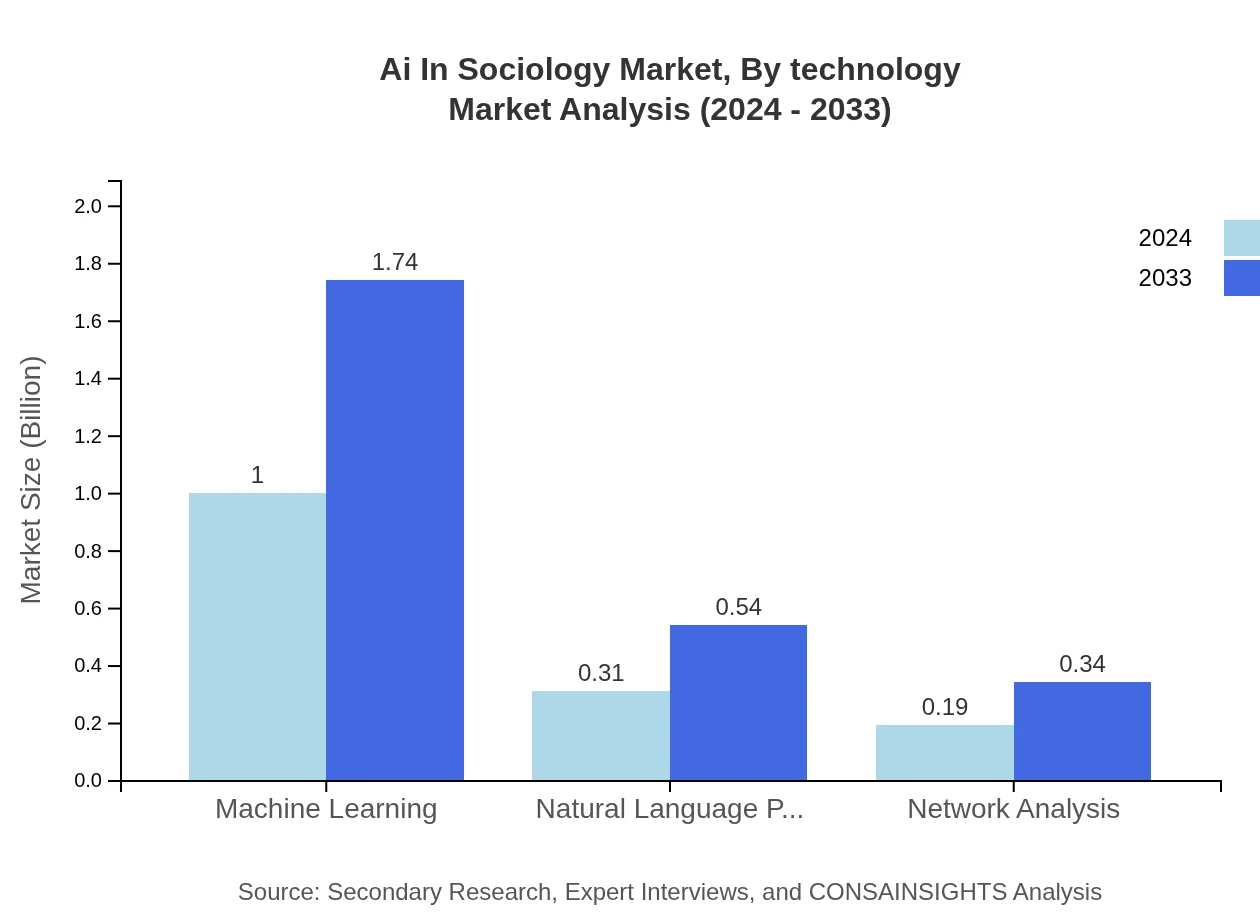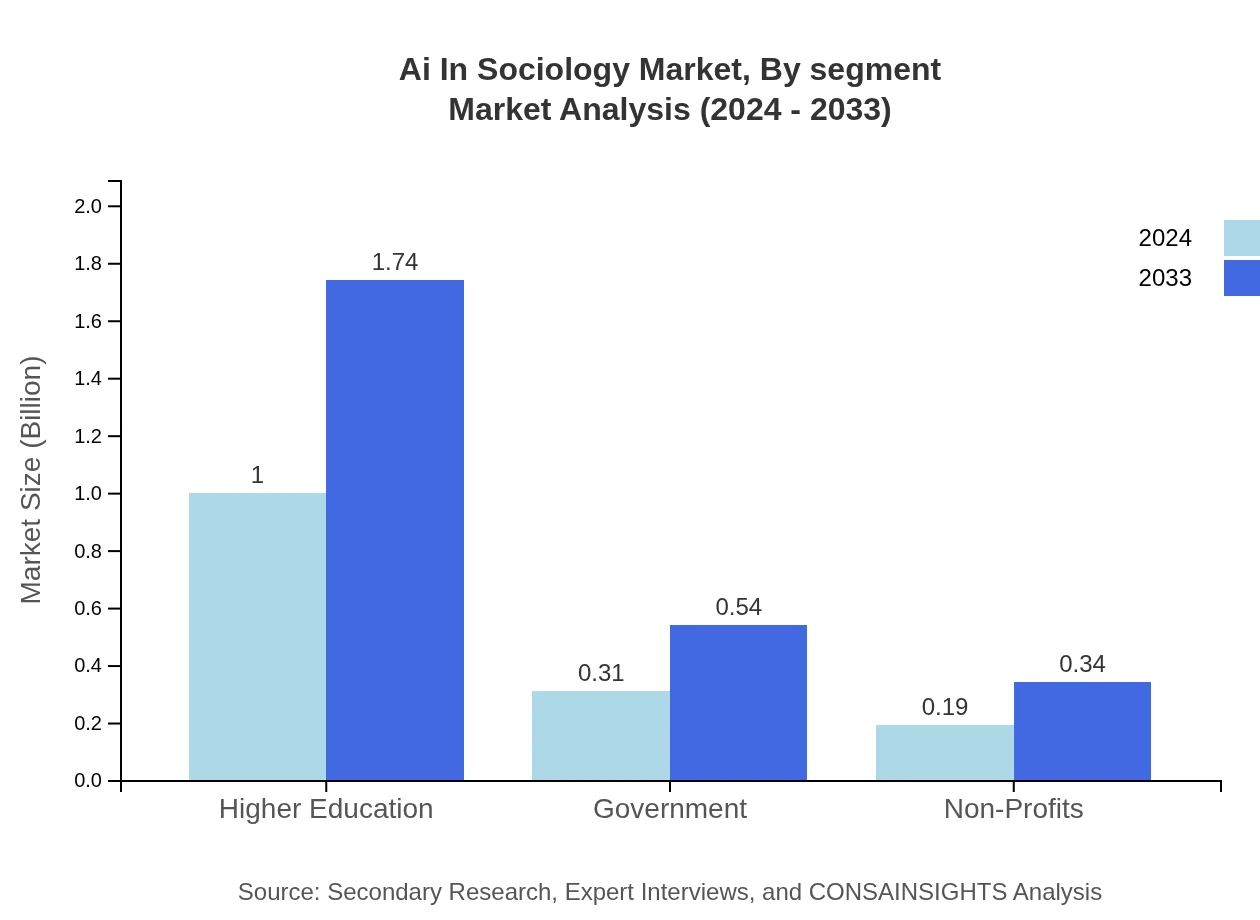Ai In Sociology
Published Date: 22 January 2026 | Report Code: ai-in-sociology
Ai In Sociology Market Size, Share, Industry Trends and Forecast to 2033
This comprehensive report presents an in-depth analysis of the emerging field of AI in Sociology. It covers market dynamics, size, segmentation, and innovative trends shaping the fusion of artificial intelligence with sociological research. Forecasting the period from 2024 to 2033, the report is a valuable resource for stakeholders and policymakers navigating this interdisciplinary domain.
| Metric | Value |
|---|---|
| Study Period | 2024 - 2033 |
| 2024 Market Size | $1.50 Billion |
| CAGR (2024-2033) | 6.2% |
| 2033 Market Size | $2.61 Billion |
| Top Companies | SociaTech Insights, InsightDynamics |
| Last Modified Date | 22 January 2026 |
Ai In Sociology Market Overview
Customize Ai In Sociology market research report
- ✔ Get in-depth analysis of Ai In Sociology market size, growth, and forecasts.
- ✔ Understand Ai In Sociology's regional dynamics and industry-specific trends.
- ✔ Identify potential applications, end-user demand, and growth segments in Ai In Sociology
What is the Market Size & CAGR of Ai In Sociology market in 2024?
Ai In Sociology Industry Analysis
Ai In Sociology Market Segmentation and Scope
Tell us your focus area and get a customized research report.
Ai In Sociology Market Analysis Report by Region
Europe Ai In Sociology:
Europe has established a strong presence with a market size estimated at 0.42 in 2024 and projected to reach 0.73 by 2033. The region benefits from extensive educational networks and a focus on ethical AI research, boosting collaborative efforts between public and private sectors.Asia Pacific Ai In Sociology:
The Asia Pacific region is witnessing significant growth driven by increased investments in digital infrastructure and academic research initiatives. In 2024, the market size is estimated at 0.28, expanding to 0.49 by 2033, reflecting robust demand for AI-powered sociological research techniques in emerging economies and established tech hubs alike.North America Ai In Sociology:
North America represents one of the largest markets, with a market size that grows from 0.57 in 2024 to 1.00 in 2033. Robust academic infrastructure, leading tech companies, and governmental support drive significant advancements in AI applications within sociological studies.South America Ai In Sociology:
In South America, the market is gradually emerging, with initial values of 0.08 in 2024 growing to 0.13 by 2033. The region is catching up due to a rising interest in data-driven policy analysis and improving technological adoption in social research.Middle East & Africa Ai In Sociology:
The Middle East and Africa are gradually integrating AI into sociology with a market size rising from 0.14 in 2024 to 0.25 by 2033. Growth in these regions is fueled by targeted investments in digital transformation and an increasing need for data-informed governance.Tell us your focus area and get a customized research report.
Ai In Sociology Market Analysis By Methodology
This segment focuses on the analytical methodologies employed in AI-driven sociological research. Emphasis is placed on leveraging quantitative methods and mixed-methods approaches that integrate numerical data with qualitative insights. The analysis underscores the evolution of traditional methodologies aligned with advanced statistical tools, thereby enhancing the reliability and validity of research findings.
Ai In Sociology Market Analysis By Application
In the application domain, AI is increasingly used in higher education, governmental research, and non-profit initiatives. The application segment highlights how organizations utilize AI to conduct policy analysis, community engagement, and social research. This integration supports enhanced decision-making, improved resource allocation, and targeted research outcomes across diverse sectors.
Ai In Sociology Market Analysis By Technology
The technology segment examines the key technological advancements driving the market. This includes a focus on machine learning, natural language processing, and network analysis tools that enable sophisticated data interpretation. Innovations in these areas are facilitating improved automation, deeper insights, and more efficient processing of complex sociological data sets.
Ai In Sociology Market Analysis By Segment
This segment provides an overall view of market segments such as Higher Education, Government, and Non-Profits. The analysis covers market size and share, highlighting how each segment benefits from AI integration. It also examines the role of advanced sociological methods like quantitative, qualitative, and mixed methods in shaping academic and policy research outcomes.
Ai In Sociology Market Trends and Future Forecast
Tell us your focus area and get a customized research report.
Global Market Leaders and Top Companies in Ai In Sociology Industry
SociaTech Insights:
A pioneering company merging artificial intelligence with sociological research, SociaTech Insights focuses on delivering data-driven solutions for academic institutions and public policy organizations, driving innovation through advanced analytics and interdisciplinary collaborations.InsightDynamics:
InsightDynamics is recognized for its cutting-edge research and development in AI applications for social sciences. The company offers robust analytical tools that empower governments, non-profits, and educational institutions to transform raw data into actionable insights, fostering informed decision-making.We're grateful to work with incredible clients.









FAQs
What is the market size of ai In Sociology?
The AI in Sociology market is projected to reach $1.5 billion by 2033, expanding with a CAGR of 6.2%. This growth reflects the increasing integration of AI technologies in sociological research and applications. Targeted growth across various segments enhances the industry's potential.
What are the key market players or companies in this ai In Sociology industry?
Key players in the AI in Sociology industry include technology firms, academic institutions, and research organizations contributing to AI development for social sciences. Partnerships between tech companies and educational institutions enhance research capabilities and foster innovative solutions in sociology.
What are the primary factors driving the growth in the ai In Sociology industry?
The growth in the AI in Sociology sector is driven by advancements in technology, increased demand for data analysis, and the rising importance of social insights in policy-making. Additionally, funding for research and a focus on evidence-based social interventions propel industry expansion.
Which region is the fastest Growing in the ai In Sociology?
North America is identified as the fastest-growing region in the AI in Sociology market, projected to rise from $0.57 billion in 2024 to $1 billion by 2033. This growth is fueled by significant investments in AI technologies and research initiatives in the region.
Does ConsaInsights provide customized market report data for the ai In Sociology industry?
Yes, ConsaInsights offers customized market reports tailored to specific needs in the AI in Sociology industry. Clients can request detailed insights based on market segments, trends, and geographical data to support their strategic decision-making.
What deliverables can I expect from this ai In Sociology market research project?
Clients can expect a comprehensive report summarizing market dynamics, trends, segments, and forecasts, including data on growth rates and competitive analysis. Additionally, visual aids such as charts and graphs will highlight crucial findings for easier interpretation.
What are the market trends of ai In Sociology?
Current trends in the AI in Sociology market include increased adoption of machine learning, natural language processing, and a focus on enhancing community engagement. These trends reflect the sector's move towards data-driven insights that align with evolving societal needs.

